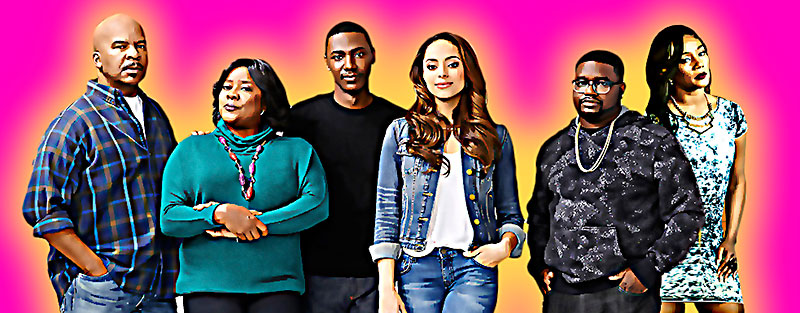My Obsession: The Carmichael Show
Pushing boundaries with NBC’s sitcom
Reviewed by Kahron Spearman, Fri., June 23, 2017
Jerrod Carmichael shouldn't have a show on NBC. It's difficult to make sense of the calculus between network television and his penchant for deliberate agitation, however intelligent the material. This is a man, a black comedian, who made a Trayvon Martin joke in his 2014 Spike Lee-directed special, Love at the Store.
"I was concerned," he said in the joke, relating a conversation he had with the doorman of his tony apartment building. "I pay a lot of money – like, a lot of money – so that niggas in hoodies, like me, can't waltz by you."
Already placing his audience in a moral predicament, he doubles down, closing the rehashed conversation with his attendant, telling him, "next time, stand your ground."
It's one of my favorite jokes of the last few years, repulsive on its face, something I'd never say aloud. However, it spoke to the dichotomy I became aware of, as a young black man making loads of money as a war profiteer – also repulsive, full stop. I, too, wondered if some young black man, who looks like me, a large man, belongs in the restaurant as I ate my avocado toast.
In this joke, and his particular branding, lies a multitude of actual statements and questions, on race, class, and the uneasiness of having confrontational social conversations lined against American apathy. Carmichael homes in on these self-conversations people living in a world often unkind, people of color including myself, have on a day-to-day basis. It's why I simply had to ingest his show whole.
A PG-version of this essence is where The Carmichael Show lives, eternal complication distilled "for a live studio audience" on network television. Currently in its third season, Carmichael tackles various race/class intertwinings, romance, transgender rights, Black Lives Matter, the specter of Trump, and more recently, voluntary euthanasia – all with a magician's deftness.
The audacious show stars Carmichael, Amber Stevens West as Maxine, his live-in girlfriend, comedian/Get Out star Lil Rel Howery as his underachieving brother Bobby, and Tiffany Haddish as Nekeisha, Bobby's out-of-control wife (who he's separated from). Veterans Loretta Devine and David Alan Grier round out the cast as Jerrod and Bobby's ultimately loving parents, Cynthia and Joe.
The traditional multi-camera setup, harkening back to Norman Lear's 1970s sitcoms, creates both constraint and a familiar platform, from which difficult topics can be more easily absorbed. Notably gone is the requirement of on-the-nose leaning on black identification. The Carmichaels are simply a working-class, wildly problematic family.
Set in Charlotte, N.C. – Carmichael's hometown, and two hours from my hometown of Greenville, S.C. – it's clear his Southern upbringing influences his outlook, both in his stand-up and the show. The use of the couch and dinner table is medium and code, an acknowledgment of family as imperfect institution, and where even loving families come together to break bread, secrets, and hearts.
Season 1's kinks worked out, the show takes off in season 2. One of the many high points is the sensitivity and nuance afforded to mental health in "The Blues," that season's eighth episode. Coming from a choppy line of people who've suffered depression, and a former sufferer myself, the episode hits squarely on the jaw.
Maxine finds Cynthia in the kitchen crying, which is unusual given Cynthia's steely demeanor. She's the stereotypical hardened black mother and wife, keeping the household together. Until recently, in many black and brown households, depression was (and still is for some) thought to be a state of mind, a dark cloud that passes for a season, instead of a treatable psychological illness. (It took years of my making – and spending – money hand over fist to admit I needed treatment.)
To this point, with comedic touch, Cynthia dismisses her sadness as temporary affairs. In the end, she only gets therapy because of a chance trip to Wendy's.
Given our here-and-now culture, The Carmichael Show will most likely disappear in the wind, for its stars are rising (especially Carmichael, Howery, and Haddish). Its mere presence is a success – signal and signpost that America has been ready to hear divisive ideas, articulated and workshopped head-on, by people of color.











